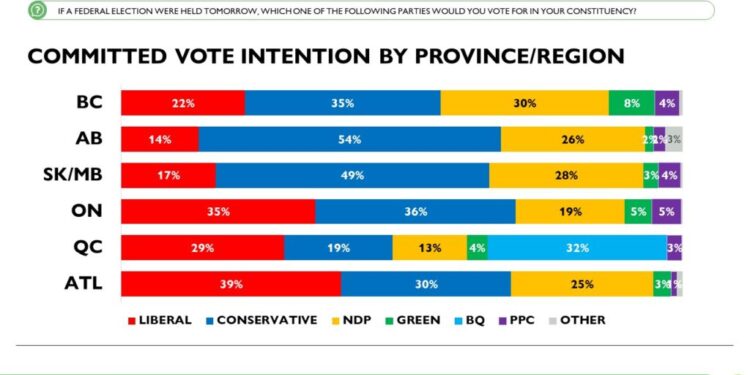Tonight on the Ezra Levant Show, Ezra highlights a significant turning point in Canadian politics as the Liberal party experiences their lowest polling numbers since taking office.
Abacus Data, historically associated with Liberal roots, conducted a national survey from June 6th to 11th, 2023, involving 2,000 adults. The poll unveils a broad desire for change among Canadians, yet an underlying discomfort with the available alternatives.
According to the survey, an overwhelming 81% of Canadians believe it is time for a change in government, signaling a widespread discontent with the current administration led by Justin Trudeau and the Liberals. However, among those seeking change, 31% express a lack of confidence in finding a suitable alternative to the Liberals — a significant obstacle in their pursuit of electoral transformation.
When considering those who do find a viable alternative, the poll reveals that 56% would vote Conservative, 25% would support the NDP, and a mere 6% would choose the Liberals.

Surprisingly, among the 31% who desire change but lack comfort in alternative options, 33% still lean towards voting Liberal, with 22% supporting the NDP, 19% favoring the Conservatives, and 14% showing preference for the Bloc Québécois.
While the desire for change remains evident, with 46% of adults willing to consider voting Liberal, there has been little change in the accessibility of the voter pool over the past two and a half years. This signifies that while Canadians express a longing for change, many have not completely closed the door on the Liberal party.
Analyzing party support, the current standings reveal a decline for the Liberals, with 28% of the national vote share—a decrease of 2% since mid-May.
In contrast, the Conservatives see a slight increase to 35%, gaining momentum. The NDP also experiences a rise, reaching 21% support. Notably, these numbers represent the lowest polling results for the Liberals in the past year.
Regional analysis demonstrates the Liberals struggling in British Columbia, where they currently stand at 22%, placing them in a distant third position.
This decline is speculated to be influenced by the fallout from the Jody Wilson-Raybould incident, with the Conservatives emerging as the dominant force and the Greens capturing 8% of the vote share—a shift unlikely to revert this time around.
In the Prairie provinces, the Conservatives enjoy substantial support, nearly obliterating their opposition. Notably, the People’s Party of Canada (PPC) garners 4% of the vote — a noteworthy factor to observe in relation to the performance of party leader Maxime Bernier.
Ontario remains a battleground, with the Conservatives and Liberals locked in a tie. However, dismissing the Greater Toronto Area (GTA) from the equation indicates a potential victory for the Conservatives in the suburban regions.
Quebec presents a unique dynamic, pitting the Liberals against the Bloc Québécois. The Conservative party’s performance remains uncertain in this province.
The Atlantic provinces prove to be a stronghold for the Liberals, exhibiting the party’s strongest support nationwide. Nevertheless, the Conservatives pose a potential threat, with the possibility of securing victories in select regions.
A wildcard factor to consider is whether the New Democratic Party (NDP) will unite behind Trudeau, thereby influencing the overall outcome.
Delving into the demographic breakdown, the survey reveals that the Conservative party appeals more to individuals under the age of 30, whereas the Liberal party experiences greater support from those aged 30 to 44. The 45 to 59 age group and seniors lean heavily toward the Conservatives.
GUEST: Laurence Fox, leader of The Reclaim Party on running for member of Parliament in Boris Johnson’s riding old riding, explains how he’s a true conservative.
https://www.rebelnews.com/ezra_levant_show_june_14_2023






